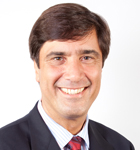
Robert Jones spent most of his more than 30-year career working in human resources at global-energy and commodities company Enron. In 2010, he became chief administrative officer at The Gavilon Group, LLC, a leading agriculture- and energy-commodities management firm, where he oversees HR, marketing, and administrative-services functions. Profile spoke with Jones about what drew him to HR, the importance of regular communication, and what he learned from working at Enron.
What was your first job in the industry?
Jones: My first human resources job was, in 1986, as supervisor of corporate payroll for a company that later became Enron. I worked in marketing, operations, administration, and accounting. When I was presented with an opportunity to get into HR, I jumped on it.
Did you start out with a fairly defined career path?
Jones: I didn’t really know what I wanted to do coming out of high school. I received a bachelor’s degree in business administration, and, as I said, I worked in several different areas before getting into HR. When I took on my first HR role, I realized this is what I was meant to do. I like the fact that HR deals with all aspects of the business; it’s something I have a passion for. I like solving problems; I like the interaction with people and that every day is a different day.
What would you say your biggest learning experience was at Enron?
Jones: A lot of people got caught up in the velocity of the business and took a lot of shortcuts, not always doing the right thing from an HR or business perspective. It was all about closing the deal. I learned that you’ve got to do things right, and for the right reasons. That includes putting people first. When the Titanic started to sink, a lot of people were only concerned about themselves. The irony is that the lifeboats sank faster than the ship.
What was your first order of business when you joined Gavilon?
Jones: When I started at Gavilon, it had only been a stand-alone entity for roughly two years, so I needed to assess what they had and what they needed. One of the first things I did was to replace the Human Resource Information System and the payroll system, which weren’t fully integrated or very reliable. We also developed a recruiting team, which has proved to be a very cost-effective initiative, given our hiring volume. We initially had a heavy reliance on outside contingency search firms.
How do you balance supervising all the departments you’re in charge of?
Jones: I have one-on-one calls or meetings with each of my direct reports every week. I let them lead the discussion; it gives me great insight into their priorities and what I can do to help them be successful. I don’t think you can overcommunicate. People want to be engaged in driving the organization forward—they want to know they’re making an impact.
Are there any business leaders you’ve worked with that you find inspirational?
Jones: I was going to retire when I left Enron, but then I met Greg Heckman, Gavilon’s CEO, and thought, this is the kind of person I want to work for. I know people with great business insight, and I know others with a knack for connecting with people, but rarely do you find someone who is both. Greg creates a team atmosphere. He knows that Gavilon will be successful if our employees have a common mission.

